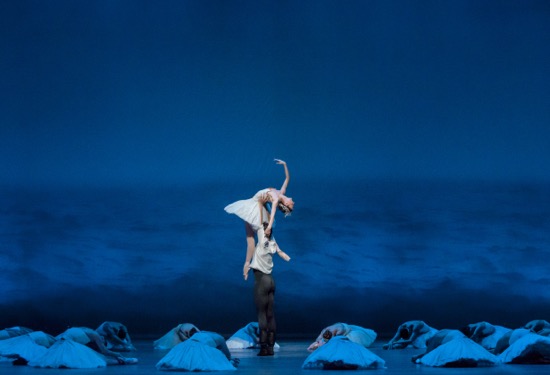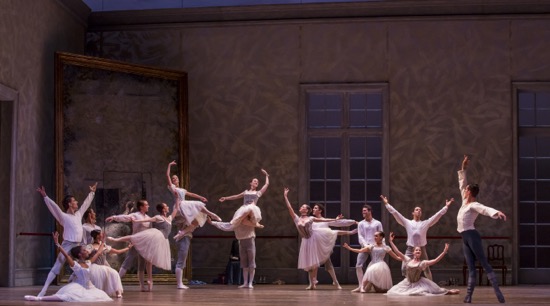
by Luis Eduardo Gonzalez
Swan Lake is one of the most loved and mesmerizing classical ballets of all time. The ballet was composed in 1875 and was Tchaikovsky’s first. It debuted in 1877 at the Bolshoi Theatre and was revamped in 1895, by Marius Petipa and Lev Ivanov in St Petersburg. Over 100 years later it remains a favorite with ballet companies regularly performing it throughout the world. So, what is it that makes a piece of art stand the test of time the way that this ballet has done? Why is it important for a company like Joffrey whose mission statement boasts “commitment to excellence and innovation” be presenting a ballet about rich guy falling in love with a girl trapped in a bird’s body? The truth is if you take the story literally it doesn’t make very much sense at all, but if one takes a moment to appreciate the underlying themes of this story, it’s easy to see just how relevant and maybe even necessary the message behind this story really is right now.
To start, the story has been considerably reimagined by Christopher Wheeldon. Set in the studios of the Paris Opera Ballet, a company dancer falls in love with his beautiful partner, a star ballerina who is being pursued by an arts patron with bad intentions. All of the swan acts may or may not happen in the lead dancer’s very capable imagination. I think what this approach does is highlight the fact that this story is not actually about a man falling for a bird, but actually about a woman trapped in unfavorable circumstances. Traditionally, Odette is trapped in a narrative where she either has to get this prince to to fall in love with her or be forced to live the rest of her life a slave to an evil sorcerer. She is in a situation that leaves her no agency over the trajectory of her life, because those choices are being made for her by men that don’t give a second thought to what she wants. At the end of the ballet Odette disappears between two diagonals of swans. What happens to her beyond that is left to the audience’s imagination, but what is certain is that she ended up away from the circumstances which once seemed to bind her fate.

We are living in a time where people all over the world are demanding change. Like Odette, people are beginning to realize that being deprived of choice in one way or another or being treated with less respect than any individual deserves is no longer acceptable. We see examples in the news every day, and several specifically in the ballet/dance world. We see women being treated like objects, dancers struggling with mental health because of abuse by those that think being in leadership positions gives them the power to treat them like punching bags on which to thrust their own insecurities. The message that Swan Lake can provide to today’s social, professional, and even political climate is that no matter how rigid and unchangeable a situation may seem, or how powerless one may feel there is always room for choice, and there is always agency over the trajectory of our own lives, over our own dancing, over our own decisions.
This ballet has beautiful music, beautiful sets, costumes, choreography, and dancing. Dancing by artists who, even in the confines of the choreography, can still find room to make nuanced choices within the steps. This allows us to use our voices to layer the work that much further by using the experiences we accumulate through the lives we lead and gives us agency over what each performance is going to say. It’s up to us as performers to use every performance to really speak, regardless of what role we’re performing. The responsibility to breathe life into these venerable classics, just like the responsibility to use our voices to better the world, lies completely on the artists and people of our generation.
It is often said that classics are losing their relevance because the character narratives in those ballets are antiquated and no longer reflect anything that our current world can relate to, but this view lacks perspective. It doesn’t take much effort to see that all over the world there are people whose voices are silenced, people who struggle and suffer because of circumstances out of their control, or people who have at one point experienced a broken heart. The ballets may have been created hundreds of years ago, but we that still perform them they are very much living in the present, living in the world, and experiencing all its current complexities. As for Siegfried, at the end of the ballet he wakes from his “dream,” and sees that this beautiful creature that was suffering through injustice, is a real woman and is in a very real way still being taken advantage of. The ballet ends with him having this new-found perspective that he didn’t have prior to his imaginative moment, and in a way is a call to action for him as well as the audience to go out and do something about it.
See Christopher Wheeldon’s version of Swan Lake for yourself! Joffrey’s performance run opens tonight. Tickets are available here – and it runs through October 28th.

Contributor Luis Eduardo Gonzalez joined The Joffrey Ballet in July 2015.
Mr. Gonzalez, is originally from Bogota, Colombia, where he grew up before moving to Atlanta, Georgia. His training came primarily from the continued direction of Maniya Barredo, former prima ballerina of Atlanta Ballet, and current director of Metropolitan Ballet Theatre. Mr. Gonzalez has received the Star Student award at Regional Dance America’s SERBA, been awarded 3rd place at the Regional Youth American Grand Prix competition in 2008, given first place pas de deux at the American Ballet Competition in 2013, and selected to compete as the only representative of Colombia in the 2014 Jackson International Ballet Competition.
Mr. Gonzalez began his professional career with The Houston Ballet II, where he had the opportunity to dance works by Stanton Welch, among other renowned choreographers, as well as tour both nationally and internationally. At 18, he joined Orlando Ballet where he danced for three years and performed roles such as the Jester in Swan Lake, Peter in Peter and the Wolf, Ghoul’s trio in Vampire’s Ball, Franz’s friend in Coppelia, and Cavalier in the Sugar Plum Pas de deux in The Nutcracker.




